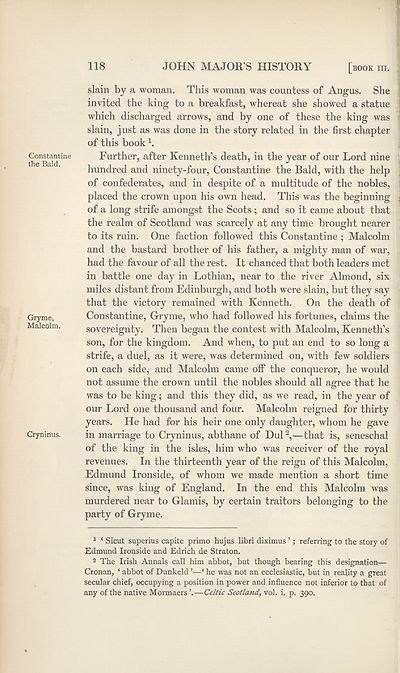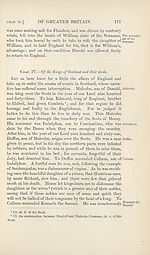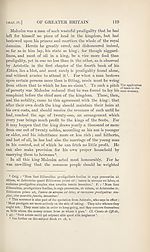Series 1 > History of Greater Britain, as well England as Scotland
(263) Page 118
Download files
Complete book:
Individual page:
Thumbnail gallery: Grid view | List view

118
JOHN MAJOR’S HISTORY
[book hi.
slain by a woman. This woman was countess of Angus. She
invited the king to a breakfast, whereat she showed a statue
which discharged arrows, and by one of these the king was
slain, just as was done in the story related in the first chapter
of this book1.
Constantine Further, after Kenneth’s death, in the year of our Lord nine
a ' hundred and ninety-four, Constantine the Bald, with the help
of confederates, and in despite of a multitude of the nobles,
placed the crown upon his own head. This was the beginning
of a long strife amongst the Scots; and so it came about that
the realm of Scotland was scarcely at any time brought nearer
to its ruin. One faction followed this Constantine ; Malcolm
and the bastard brother of his father, a mighty man of war,
had the favour of all the rest. It chanced that both leaders met
in battle one day in Lothian, near to the river Almond, six
miles distant from Edinburgh, and both were slain, but they say
that the victory remained with Kenneth. On the death of
Gryme, Constantine, Gryme, who had followed his fortunes, claims the
Malcolm. sovereignty. Then began the contest with Malcolm, Kenneth’s
son, for the kingdom. And when, to put an end to so long a
strife, a duel, as it were, was determined on, with few soldiers
on each side, and Malcolm came off the conqueror, he would
not assume the crown until the nobles should all agree that he
was to be king; and this they did, as we read, in the year of
our Lord one thousand and four. Malcolm reigned for thirty
years. He had for his heir one only daughter, whom he gave
Cryninus. in marriage to Cryninus, abthane of Dul2,—that is, seneschal
of the king in the isles, him who was receiver of the royal
revenues. In the thirteenth year of the reign of this Malcolm,
Edmund Ironside, of whom we made mention a short time
since, was king of England. In the end this Malcolm was
murdered near to Glamis, by certain traitors belonging to the
party of Gryme.
1 ‘ Sicut superius capite primo hujus libri diximus ’; referring to the story of
Edmund Ironside and Edrich de Straton.
2 The Irish Annals call him abbot, but though bearing this designation—
Cronan, ‘ abbot of Dunkeld ’—‘ he was not an ecclesiastic, but in reality a great
secular chief, occupying a position in power and influence not inferior to that of
any of the native Mormaers ’.—Celtic Scotland, vol. i. p. 390.
JOHN MAJOR’S HISTORY
[book hi.
slain by a woman. This woman was countess of Angus. She
invited the king to a breakfast, whereat she showed a statue
which discharged arrows, and by one of these the king was
slain, just as was done in the story related in the first chapter
of this book1.
Constantine Further, after Kenneth’s death, in the year of our Lord nine
a ' hundred and ninety-four, Constantine the Bald, with the help
of confederates, and in despite of a multitude of the nobles,
placed the crown upon his own head. This was the beginning
of a long strife amongst the Scots; and so it came about that
the realm of Scotland was scarcely at any time brought nearer
to its ruin. One faction followed this Constantine ; Malcolm
and the bastard brother of his father, a mighty man of war,
had the favour of all the rest. It chanced that both leaders met
in battle one day in Lothian, near to the river Almond, six
miles distant from Edinburgh, and both were slain, but they say
that the victory remained with Kenneth. On the death of
Gryme, Constantine, Gryme, who had followed his fortunes, claims the
Malcolm. sovereignty. Then began the contest with Malcolm, Kenneth’s
son, for the kingdom. And when, to put an end to so long a
strife, a duel, as it were, was determined on, with few soldiers
on each side, and Malcolm came off the conqueror, he would
not assume the crown until the nobles should all agree that he
was to be king; and this they did, as we read, in the year of
our Lord one thousand and four. Malcolm reigned for thirty
years. He had for his heir one only daughter, whom he gave
Cryninus. in marriage to Cryninus, abthane of Dul2,—that is, seneschal
of the king in the isles, him who was receiver of the royal
revenues. In the thirteenth year of the reign of this Malcolm,
Edmund Ironside, of whom we made mention a short time
since, was king of England. In the end this Malcolm was
murdered near to Glamis, by certain traitors belonging to the
party of Gryme.
1 ‘ Sicut superius capite primo hujus libri diximus ’; referring to the story of
Edmund Ironside and Edrich de Straton.
2 The Irish Annals call him abbot, but though bearing this designation—
Cronan, ‘ abbot of Dunkeld ’—‘ he was not an ecclesiastic, but in reality a great
secular chief, occupying a position in power and influence not inferior to that of
any of the native Mormaers ’.—Celtic Scotland, vol. i. p. 390.
Set display mode to:
![]() Universal Viewer |
Universal Viewer | ![]() Mirador |
Large image | Transcription
Mirador |
Large image | Transcription
Images and transcriptions on this page, including medium image downloads, may be used under the Creative Commons Attribution 4.0 International Licence unless otherwise stated. ![]()
| Scottish History Society volumes > Series 1 > History of Greater Britain, as well England as Scotland > (263) Page 118 |
|---|
| Permanent URL | https://digital.nls.uk/127734921 |
|---|
| Attribution and copyright: |
|
|---|
| Description | Over 180 volumes, published by the Scottish History Society, containing original sources on Scotland's history and people. With a wide range of subjects, the books collectively cover all periods from the 12th to 20th centuries, and reflect changing trends in Scottish history. Sources are accompanied by scholarly interpretation, references and bibliographies. Volumes are usually published annually, and more digitised volumes will be added as they become available. |
|---|


